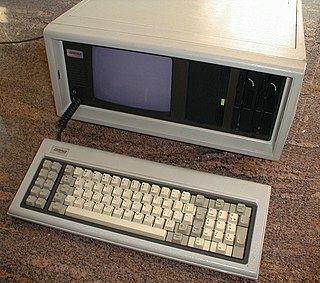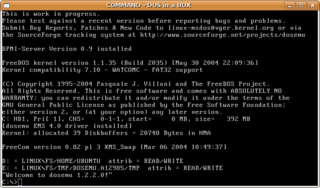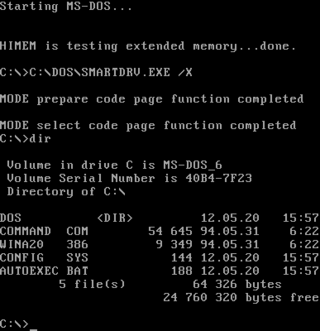Related Research Articles

The Apple II series is a family of home computers, one of the first highly successful mass-produced microcomputer products, designed primarily by Steve Wozniak, manufactured by Apple Computer, and launched in 1977 with the original Apple II.

IBM PC compatible computers are similar to the original IBM PC, XT, and AT, all from computer giant IBM, that are able to use the same software and expansion cards. Such computers were referred to as PC clones, IBM clones or IBM PC clones. The term "IBM PC compatible" is now a historical description only, since IBM no longer sells personal computers after it sold its personal computer division in 2005 to Chinese technology company Lenovo. The designation "PC", as used in much of personal computer history, has not meant "personal computer" generally, but rather an x86 computer capable of running the same software that a contemporary IBM PC could. The term was initially in contrast to the variety of home computer systems available in the early 1980s, such as the Apple II, TRS-80, and Commodore 64. Later, the term was primarily used in contrast to Apple's Macintosh computers.

Digital Research, Inc. was a company created by Gary Kildall to market and develop his CP/M operating system and related 8-bit, 16-bit and 32-bit systems like MP/M, Concurrent DOS, FlexOS, Multiuser DOS, DOS Plus, DR DOS and GEM. It was the first large software company in the microcomputer world. Digital Research was originally based in Pacific Grove, California, later in Monterey, California.

FreeDOS is a free software operating system for IBM PC compatible computers. It intends to provide a complete MS-DOS-compatible environment for running legacy software and supporting embedded systems.

CP/M-86 was a version of the CP/M operating system that Digital Research (DR) made for the Intel 8086 and Intel 8088. The system commands are the same as in CP/M-80. Executable files used the relocatable .CMD file format. Digital Research also produced a multi-user multitasking operating system compatible with CP/M-86, MP/M-86, which later evolved into Concurrent CP/M-86. When an emulator was added to provide PC DOS compatibility, the system was renamed Concurrent DOS, which later became Multiuser DOS, of which REAL/32 is the latest incarnation. The FlexOS, DOS Plus, and DR DOS families of operating systems started as derivations of Concurrent DOS as well.
4DOS is a command-line interpreter by JP Software, designed to replace the default command interpreter COMMAND.COM in Microsoft DOS and Windows. It was written by Rex C. Conn and Tom Rawson and first released in 1989. Compared to the default, it has a large number of enhancements.
In computing, the DOS Protected Mode Interface (DPMI) is a specification introduced in 1989 which allows a DOS program to run in protected mode, giving access to many features of the new PC processors of the time not available in real mode. It was initially developed by Microsoft for Windows 3.0, although Microsoft later turned control of the specification over to an industry committee with open membership. Almost all modern DOS extenders are based on DPMI and allow DOS programs to address all memory available in the PC and to run in protected mode.
DOSBox is a free and open-source emulator which runs software for MS-DOS compatible disk operating systems—primarily video games. It was first released in 2002, when DOS technology was becoming obsolete. Its adoption for running DOS games is widespread, with it being used in commercial re-releases of those games as well. DOSBox can be downloaded and used from the video game console emulator front-end RetroArch.

DOSEMU, stylized as dosemu, is a compatibility layer software package that enables DOS operating systems and application software to run atop Linux on x86-based PCs.
Virtual DOS machines (VDM) refer to a technology that allows running 16-bit/32-bit DOS and 16-bit Windows programs when there is already another operating system running and controlling the hardware.

Multiuser DOS is a real-time multi-user multi-tasking operating system for IBM PC-compatible microcomputers.
A DOS extender is a computer software program running under DOS that enables software to run in a protected mode environment even though the host operating system is only capable of operating in real mode.
A disk compression software utility increases the amount of information that can be stored on a hard disk drive of given size. Unlike a file compression utility, which compresses only specified files—and which requires the user to designate the files to be compressed—an on-the-fly disk compression utility works automatically through resident software without the user needing to be aware of its existence. On-the-fly disk compression is therefore also known as transparent, real-time or online disk compression.
DriveSpace is a disk compression utility supplied with MS-DOS starting from version 6.0 in 1993 and ending in 2000 with the release of Windows Me. The purpose of DriveSpace is to increase the amount of data the user could store on disks by transparently compressing and decompressing data on-the-fly. It is primarily intended for use with hard drives, but use for floppy disks is also supported. This feature was removed in Windows XP and later.
A source-to-source translator, source-to-source compiler, transcompiler, or transpiler is a type of translator that takes the source code of a program written in a programming language as its input and produces an equivalent source code in the same or a different programming language. A source-to-source translator converts between programming languages that operate at approximately the same level of abstraction, while a traditional compiler translates from a higher level programming language to a lower level programming language. For example, a source-to-source translator may perform a translation of a program from Python to JavaScript, while a traditional compiler translates from a language like C to assembler or Java to bytecode. An automatic parallelizing compiler will frequently take in a high level language program as an input and then transform the code and annotate it with parallel code annotations or language constructs.
Links is a series of golf simulation video games, first developed by Access Software, and then later by Microsoft after it acquired Access Software in 1999. Microsoft also produced its own series of golf games based on Links, under the title Microsoft Golf. The Links series was a flagship brand for Access, and was continued from 1990 to 2003. The first game in the series, Links: The Challenge of Golf, won Computer Gaming World's 1991 Action Game of the Year award.

Windows 3.0 is the third major release of Microsoft Windows, launched in 1990. It features a new graphical user interface (GUI) where applications are represented as clickable icons, as opposed to the list of file names seen in its predecessors. Later updates would expand the software's capabilities, one of which added multimedia support for sound recording and playback, as well as support for CD-ROMs.

MS-DOS is an operating system for x86-based personal computers mostly developed by Microsoft. Collectively, MS-DOS, its rebranding as IBM PC DOS, and a few operating systems attempting to be compatible with MS-DOS, are sometimes referred to as "DOS". MS-DOS was the main operating system for IBM PC compatibles during the 1980s, from which point it was gradually superseded by operating systems offering a graphical user interface (GUI), in various generations of the graphical Microsoft Windows operating system.

DOS is a family of disk-based operating systems for IBM PC compatible computers. The DOS family primarily consists of Microsoft's MS-DOS and a rebranded version, IBM PC DOS, both of which were introduced in 1981. Later compatible systems from other manufacturers include DR DOS (1988), ROM-DOS (1989), PTS-DOS (1993), and FreeDOS (1998). MS-DOS dominated the IBM PC compatible market between 1981 and 1995.
References
- ↑ "HelpDesk". InfoWorld. 29 August 1994. p. 41.
- ↑ Microcomputers (1995). Windows/DOS Developer's Journal. R&D Publications.
- ↑ "DEP Terry Colligan | Bitácora de Javier Gutiérrez Chamorro (Guti)". 17 September 2018.